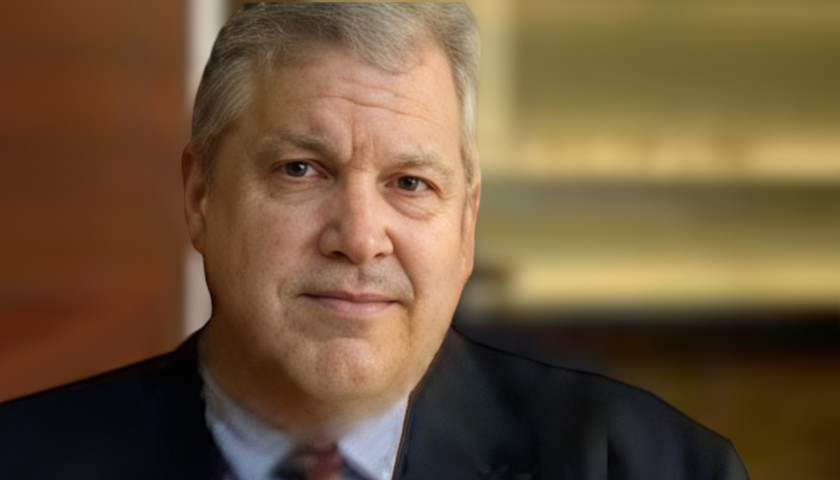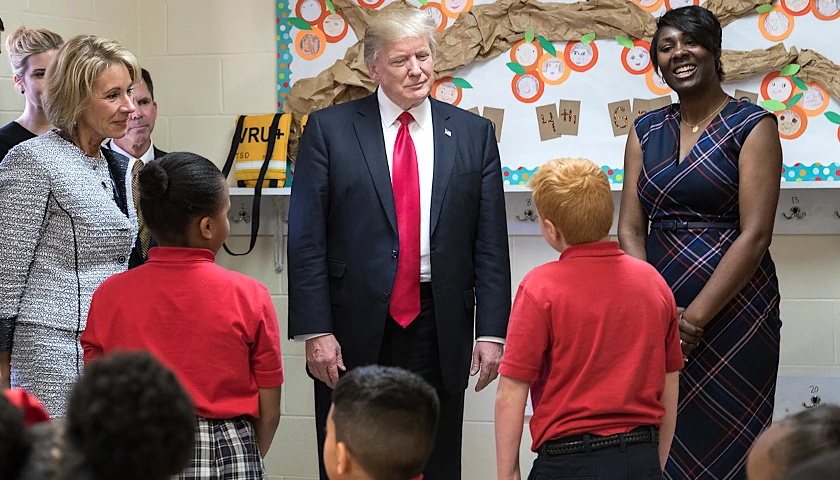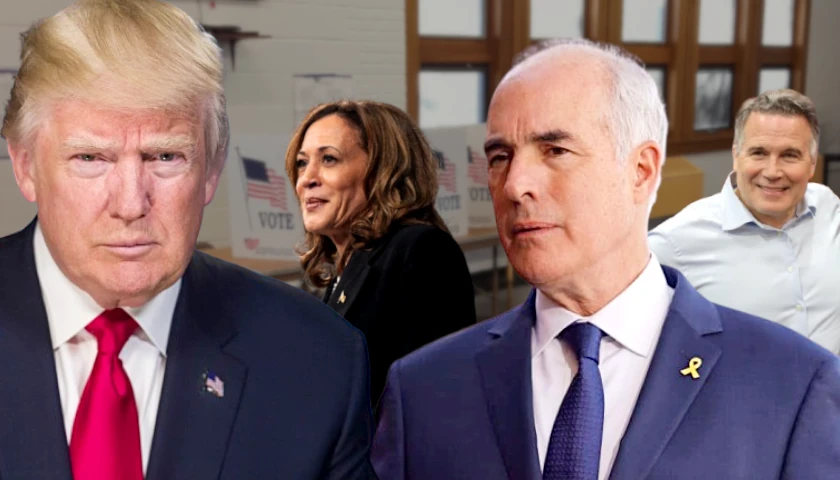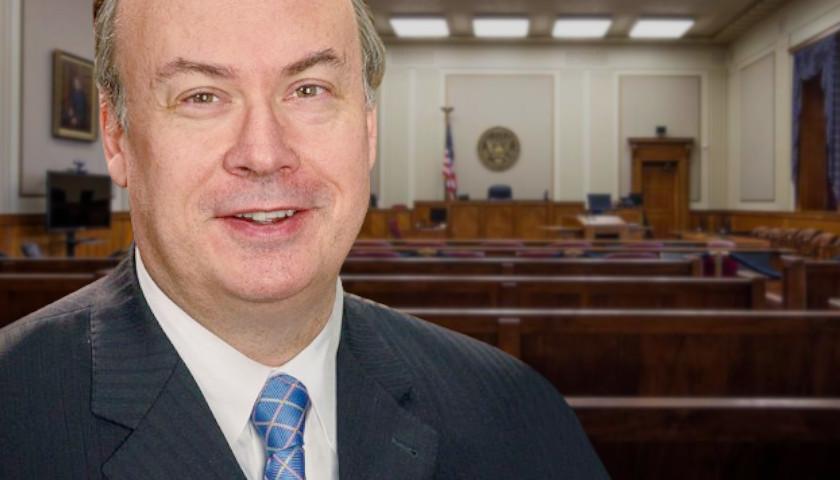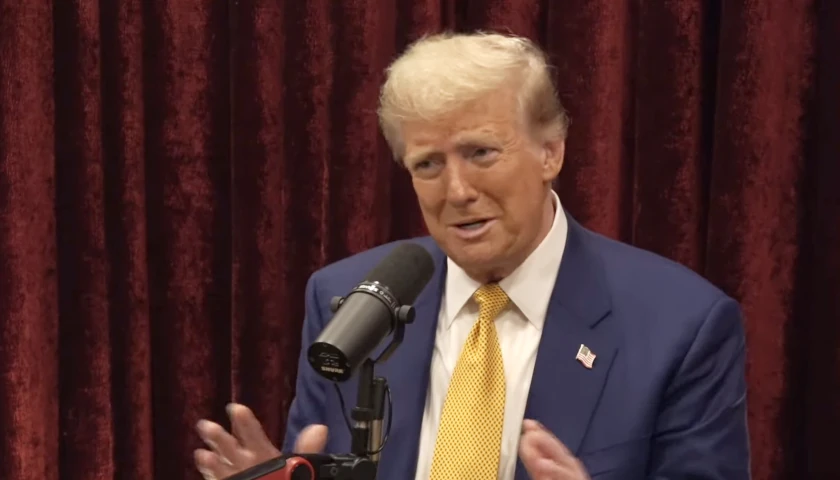Scott J. Bloch, Special Counsel of the Office of Special Counsel (OSC) under former President George W. Bush from 2003 to 2008, told The Tennessee Star on Saturday that a a provision of the 1939 Hatch Act, now codified as 18 U.S.C. 595, could be used to prosecute Biden Administration Department of Justice and Department of Homeland Security officials for election interference and affecting the 2024 election.
Bloch (pictured above) responded to The Star’s inquiry via email on Saturday asking:
Could Section 2 of the 1939 Hatch Act (codified today as 18 U.S.C 595), which prohibits election interference by federal, state, and local officials, be used to prosecute the pantheon of Biden administration officials who have organized the multiple lawsuits against Donald J. Trump?
Bloch wrote, “What is going on in the current administration goes even beyond what I investigated at OSC. I am referring to many examples in the news of use of the justice system to affect the election, the suppression of speech by DOJ and Homeland Security relating to political opponents, which appears to be tinged with intent to interfere with elections.”
“We brought many administrative prosecutions of Hatch Act violations when I was head of the U.S. Office of Special Counsel (2003-2008),” he noted.
“In 2007-2008, I called for and organized and went after a broad scale use of the federal government to affect elections nationally, which resulted in a major report (after I left office) of the Bush Administration program to get more members of Congress and Governors elected using official capacity at the federal level as well as federal resources. I received a special appropriation of $1M to conduct that particular investigation. This was spurred by an initial large investigation of GSA and its head for offering federal buildings and resources nationally to help get GOP candidates elected,” he continued.
“I came close to referring that matter to the DOJ for possible criminal prosecution, but I did not do so because I did not see specific intent to interfere with elections, but I might have referred it once that report came out (which was not completed when I was in office),” Bloch added.
“What is going on in the current administration goes even beyond what I investigated at OSC. I am referring to many examples in the news of use of the justice system to affect the election, the suppression of speech by DOJ and Homeland Security relating to political opponents, which appears to be tinged with intent to interfere with elections,” he noted.
“As such, if I were current Special Counsel, provided I had a complaint and found sufficient prima facie evidence of intent, I would refer to DOJ the criminal prosecution of individuals in the Department of Justice, Department of Homeland Security and possibly elsewhere under 18 USC 595 which is broader than interference with elections or the political process; it also includes actions by officials of the U.S. government that ‘affects’ elections,” he concluded.
As Bloch notes, the language of 18 U.S.C 595 is quite broad:
Whoever, being a person employed in any administrative position by the United States, or by any department or agency thereof, or by the District of Columbia or any agency or instrumentality thereof, or by any State, Territory, or Possession of the United States, or any political subdivision, municipality, or agency thereof, or agency of such political subdivision or municipality (including any corporation owned or controlled by any State, Territory, or Possession of the United States or by any such political subdivision, municipality, or agency), in connection with any activity which is financed in whole or in part by loans or grants made by the United States, or any department or agency thereof, uses his official authority for the purpose of interfering with, or affecting, the nomination or the election of any candidate for the office of President, Vice President, Presidential elector, Member of the Senate, Member of the House of Representatives, Delegate from the District of Columbia, or Resident Commissioner, shall be fined under this title or imprisoned not more than one year, or both.
This section shall not prohibit or make unlawful any act by any officer or employee of any educational or research institution, establishment, agency, or system which is supported in whole or in part by any state or political subdivision thereof, or by the District of Columbia or by any Territory or Possession of the United States; or by any recognized religious, philanthropic or cultural organization. (emphasis added)
A brief search of election interference prosecution could find no instance of anyone ever being prosecuted by the DOJ for violating 18 U.S.C. 595, though it has been cited as an authority in a few federal cases as well as one state case. Surprisingly, 18 U.S.C 595 was also cited as a legal authority in an Amicus Brief filed in April in support of the DOJ’s position opposing former President Trump claim of presidential immunity by former Senator John Danforth and others in the pending current Supreme Court case.
A former DOJ official told The Star it is not surprising that few if any prosecutions have been brought under 18 U.S.C. 595 due to the vagueness and broadness of the statute.
Other statutes beyond 18 U.S.C. 595 might also apply, Bloch said.
“There might also be political coercion of federal employees by the Administration, under 18 USC 610. There also appears to be some evidence of intimidation of voters by DOJ and the FBI, under 18 USC 594. There might also be evidence of offers of judgeships in exchange for political attacks on enemies of the administration, which is also a crime under 18 U.S.C. 599 and 600. All of those criminal statutes are solely under the jurisdiction of the U.S. Department of Justice,” he added.
“The U.S. Office of Special Counsel (OSC) is an independent federal investigative and prosecutorial agency. OSC’s statutory authority comes from four federal laws: the Civil Service Reform Act, the Whistleblower Protection Act, the Hatch Act, and the Uniformed Services Employment & Reemployment Rights Act (USERRA),” according to the agency’s website.
The current Special Counsel of OSC is Hampton Dellinger, who “was sworn in as Special Counsel on March 6, 2024. Dellinger graduated from the University of Michigan at Ann Arbor and Yale Law School. Prior to joining OSC, Dellinger served in the U.S. Department of Justice as an Assistant Attorney General overseeing the Office of Legal Policy. In both government and private practice, Dellinger has represented whistleblowers and other clients challenging government activities, and is an experienced litigator and legal advocate. He is also a former Deputy Attorney General in the North Carolina Department of Justice and served as Chief Legal Counsel in the Office of the North Carolina Governor.”
Dellinger was confirmed in his position by the U.S. Senate in a party line vote of 49 to 47 on February 27. His father is the late Walter Dellinger, who served as Acting U.S. Solicitor General in the Clinton administration.
Former Special Council Bloch’s tenure at the Office of Special Counsel ended in controversy. Today, that controversy may be seen in a new light, given the numerous instances of lawfare against conservative attorneys during the Biden administration.
In May 2008, the FBI raided his home and office, searching for evidence that he had obstructed justice by deleting some computer files.
“The May 6 FBI raids on the office and home of Office of Special Counsel (OSC) Scott Bloch were the latest twist in the long-running war between the conservative Bloch and his many enemies. Bloch stands accused of obstructing justice in a case against him filed by career federal bureaucrats who claim he retaliated against them because he believed they were undermining his policies. Though most of the evidence for Bloch’s obstruction is either unknown publicly or non-existent, Bloch did have the hard drives of his computer and perhaps those of staff members wiped clean in 2006 by Geeks on Call. Bloch said that his computer was infected by a tenacious virus and that he kept copies of all deleted files,” Human Events reported two weeks after that raid.
“Bloch enraged Democrats, the media, and liberal Republicans when shortly after his appointment by President Bush in 2003, he removed “sexual orientation” from the classes of specially protected civil rights categories in OSC literature. Since then, the MSM, pressure groups, and a few liberal Republicans in the Bush Administration and on Capitol Hill have made an example of Bloch, trying to get him fired or forced to resign. Some have even employed anti-Catholic and anti-Christian arguments, decrying the regular worship habits of Bloch, grandson of well-known abstract expressionist painter Albert Bloch, and many of his staff. Yet both civil rights law and OSC’s success in its primary missions are on Bloch’s side,” Human Events noted.
Block was removed from office by the Bush administration in October 2008, and in 2010 pleaded guilty to a misdemeanor charge of “criminal contempt of Congress for withholding that he ordered private technicians to ‘scrub’ computer files at the Office of Special Counsel in December 2006.” In August 2011, a federal judge allowed Bloch to withdaw that guilty plea.
In 2012, the Obama DOJ filed another misdemeanor charge of destruction of government property against him.
“The saga that is the criminal prosecution of former Bush administration whistleblower attorney Scott Bloch is inching toward a final resolution. Bloch pleaded guilty in Washington’s federal trial court on February 12 to the misdemeanor charge of destruction of government property. U.S. District Judge Robert Wilkins set sentencing for May 13. The charge carries a maximum punishment of up to a year in jail. There is no mandatory-minimum term,” the National Law Journal reported in February 2013.
In May 2013 he was sentenced to spend one day in jail.
In 2014, Bloch’s law license was temporarily suspended for 30 days by both the state of California and the District of Columbia.
Bloch’s lawsuit against the federal government, Bloch v. Executive Office of the President, alleging he was improperly removed from public office in 2008 was dismissed by Federal District Court Judge for D.C. Thomas Ellis in 2016.
“In his fifteen-count Amended Complaint, plaintiff alleges that he was removed from office as Special Counsel in violation of constitutional and statutory law as the result of a wide-ranging conspiracy by various federal agencies and officials. The Amended Complaint further alleges (i) that this conspiracy was unlawful under RICO and 42 U.S.C. § 1985(1) and (ii) that the conspiracy ultimately led plaintiff to suffer violations of his rights under the Privacy Act, the Constitution, and various common law tort duties,” Judge Ellis began his opinion.
Ellis rejected each of the fifteen counts alleged by Bloch, and concluded by stating, “For the foregoing reasons, defendants’ motion to dismiss must be granted, and plaintiff’s motion forleave to amend must be denied.”
Bloch currently practices law in Washington, D.C. and is licensed in the District of Columbia, Kansas, and California.
– – –
Michael Patrick Leahy is the founder and CEO of the Star News Network, which includes The Tennessee Star. Follow Leahy on X at @michaelpleahy.
Photo “Scott Bloch” by Scott Bloch.

